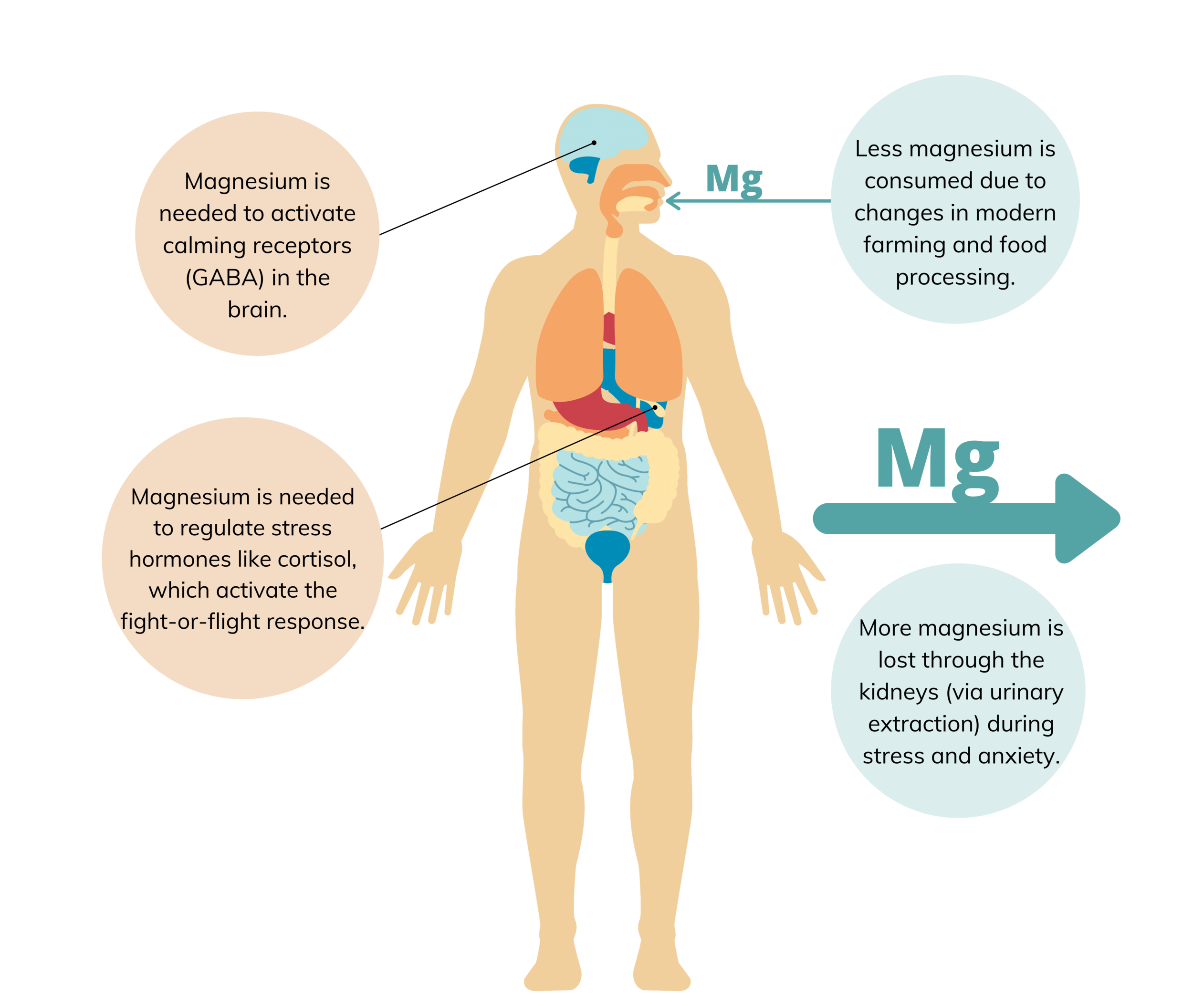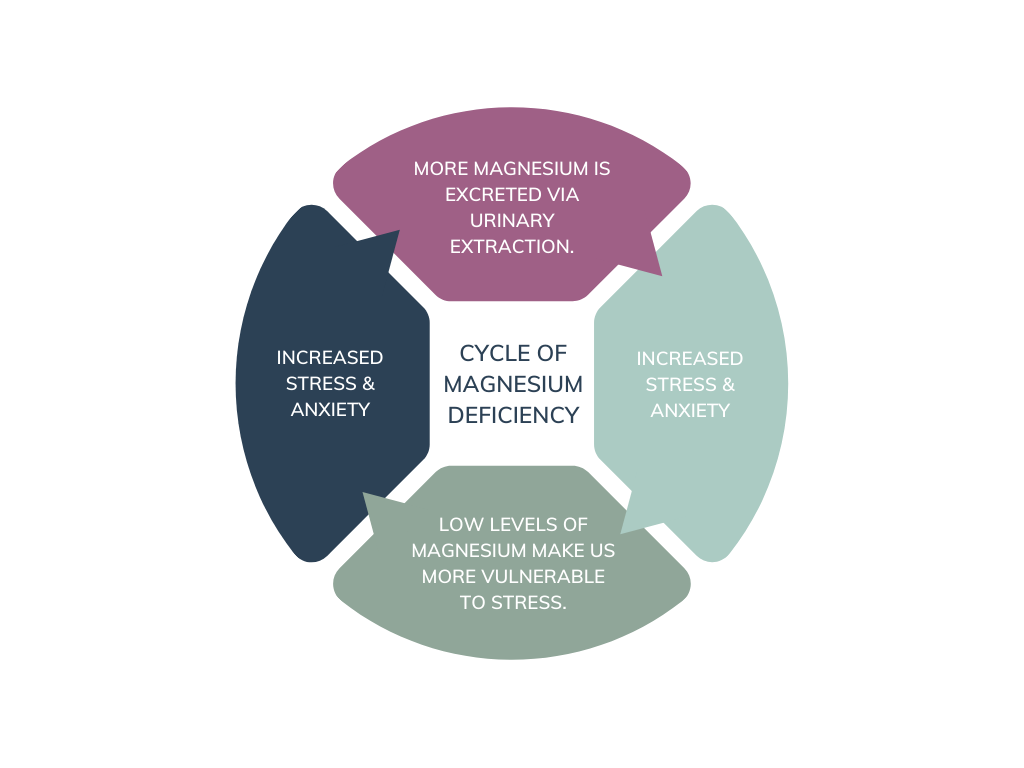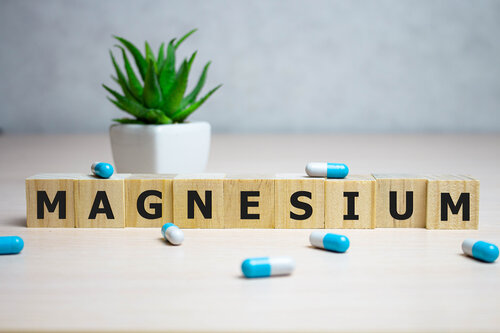If you have anxiety, a common but overlooked nutritional deficiency may be contributing to your symptoms: magnesium. It plays a critical calming role in the brain and body and has even been dubbed “the original chill pill” and “nature’s valium.” Too little of this mineral can leave us feeling fatigued, stressed, and panicked.
In this article, we shine a spotlight on magnesium and reveal its important function in psychiatry and mental health. We address questions about magnesium like:
- What is magnesium, and why is it important?
- What do we know about magnesium’s effect on anxiety?
- Should I take magnesium if I have anxiety?
- Why are so many people magnesium deficient?
- What are the common symptoms of magnesium deficiency?
- Can I get tested for magnesium deficiency?
What is magnesium, and why is it important?
Magnesium is an essential mineral, similar to calcium and iron, that has widespread effects in the body. It is involved in about 80% of the body’s functions. This includes energy production, which is why low levels of magnesium can make us feel tired and weak.
Magnesium also plays a vital role in brain health, including stress and anxiety. By blocking stimulating neurotransmitters and binding to calm, restful receptors in the brain, magnesium can help us relax. It also has effects on the HPA axis, the body’s main system responsible for managing and responding to stress, by regulating stress hormones like cortisol. Magnesium acts like the brake of your nervous system, keeping it from being stuck in overdrive.
What do we know about magnesium’s effect on anxiety?
While there is clear evidence for the biological mechanisms behind magnesium’s calming activity in the brain, as well as its effect in animal studies, clinical studies in humans have been supportive but not conclusive.
The clinical studies of magnesium’s effect on anxiety have had many limitations, such as:
- Small sample sizes.
- Forms of magnesium that aren’t well-absorbed or available for use. Most magnesium studies have focused on the lactate and oxide forms, both of which are not absorbed into the body and brain.
- Doses of magnesium that may have been too low to have a therapeutic effect on the brain. For example, some older studies used 40 – 200mg of magnesium, which is lower than the recommended daily intake, and saw no significant change. A newer study, however, used over 1000mg of magnesium and saw evidence of brain aging reversal.
It may be a long time before we have conclusive, large-scale studies about the effectiveness of magnesium supplementation on anxiety, as there is little financial incentive to fund studies about a naturally-occurring mineral that is easily available. In the meantime, however, there is enough strong evidence showing that magnesium does have a relaxing and calming effect in both laboratory studies of animals and clinical experience of doctors like myself.
Should I take magnesium if I have anxiety?
As magnesium is an essential nutrient that is relatively safe, patients and their doctors should consider a trial of magnesium when surveying treatment options for anxiety.
SSRIs like Prozac are the most commonly used anti-anxiety medications, but they don’t work for 30% of patients. While benzodiazepines (Xanax, Valium, etc.) can be more effective, these medications can have more serious side effects and potential for dependency and withdrawal.
For many people with anxiety who may be hesitant to try stronger medications, magnesium can be a more gentle, well-tolerated way to start treatment.
Nearly 50% of Americans don’t get enough magnesium. Why are so many people magnesium deficient?
The recommended daily intake of magnesium is 420 mg/day for men and 360 mg/day for women. Sufficient magnesium levels are critical for handling stress, especially with the current challenges of the COVID-19 pandemic. Yet, about 50% of Americans are deficient in magnesium.
The combination of modern food cultivation & processing and long-term stress has set us up for magnesium deficiency.
We mainly rely on food sources to get healthy levels of magnesium and other minerals. However, the amount of magnesium and other minerals, including iron and calcium, available in our food has dramatically decreased over the last 70-100 years for two main reasons:
- Modern farming processes have depleted magnesium and other minerals from the soil. This means that even if you eat a healthy diet with nutrient-rich foods like vegetables, nuts, and seeds, you can still be magnesium deficient.
- We are eating more processed foods. The techniques involved in converting whole foods into processed foods significantly reduces the amount of magnesium and other nutrients. Some food processing techniques can strip away up to 80% of the magnesium content of grains.
People used to get around 500mg of magnesium daily. Now, the average intake has fallen to about 200 – 275mg. In other words, we are currently getting less than half the daily amount of magnesium than we used to.

Magnesium deficiency can have a spiraling effect. If we don’t get enough magnesium from our food, we are more vulnerable to high levels of stress and anxiety. More stress can lead us to lose even more magnesium through the kidneys in a process of urinary extraction. Caffeine and alcohol can accelerate the rate of magnesium excretion. Losing too much magnesium through our waste can then lead to even higher levels of stress and anxiety, continuing the cycle.

Since magnesium deficiency is common and can impact many systems in the body, let’s review symptoms and lab testing for this mineral.
What are the common symptoms of magnesium deficiency?
In addition to anxiety, some of the immediate effects of magnesium deficiency are:
- Muscle spasms and tightness
- Insomnia or sleep disturbances
- Constipation
- Headaches
- Fatigue
Magnesium deficiency has also been found in patients with depression and other psychiatric disorders.
While some people may reach for magnesium to help with anxiety, sleep, or headaches, raising our levels of this mineral can also protect us from developing a number of chronic medical conditions, such as type II diabetes, hypertension, cardiovascular disease, and even neurological disorders.
Can I get tested for magnesium deficiency?
The simple answer is no – we do not have a reliable blood test for magnesium deficiency. Magnesium is mostly stored in our bones or other organs like the brain, and less than 1% of magnesium stores are in the blood. Therefore, conventional blood tests do not accurately reflect the total magnesium body stores.
This means that even if your blood levels of magnesium are in the normal range, you may still be magnesium deficient and could benefit from supplementation.
How can I tell if I’m magnesium deficient?
Since we can’t use a simple blood test to diagnose magnesium deficiency, we need to look at the bigger picture. In addition to the symptoms listed above, ask yourself:
- Am I getting enough magnesium intake through my food?
- Am I taking any medications that would interfere with magnesium absorption in the gut?
- Proton pump inhibitor medications like Prilosec can inhibit magnesium absorption.
- Am I under a great deal of stress that could lead to excess excretion of magnesium?
Magnesium can be an important part of our tool kit for mental & brain health.
Of all the supplements that I recommend in my practice, magnesium gets the best feedback from patients. They often report not only reduction in anxiety, but also better sleep, fewer headaches, and less muscle tension. Many even choose to stay on magnesium supplements after our treatment to help them manage stress in their daily lives.
While magnesium is not a cure-all treatment for anxiety, it can be a foundational part of healing that should be accompanied by healthy eating, proper treatment, and stress reduction. In addition to addressing your magnesium levels, you should also work with a doctor to examine other potential root causes such as biological imbalances and trauma.
Now that you know how critical magnesium is for managing anxiety and so many other functions in the body, you may be wondering how you can increase your magnesium intake. In our next article, we discuss the most effective ways of increasing magnesium levels through food and supplements.
References
1. “The Role and the Effect of Magnesium in Mental Disorders: A Systematic Review” Nutrients (2020)
2. “Magnesium in Prevention and Therapy” Nutrients (2015)
3. “Timeline (Bioavailability) of Magnesium Compounds in Hours: Which Magnesium Compound Works Best?” Biology Trace Element Research (2019)
4. “Association between magnesium intake and depression and anxiety in community-dwelling adults: the Hordaland Health Study” Australia and New Zealand Journal of Psychiatry (2009)
5. “The Association between Serum Magnesium Levels and Depression in an Adult Primary Care Population” Nutrients (2019)
6. “Challenges in the Diagnosis of Magnesium Status” Nutrients (2018)
7. “Magnesium in Prevention and Therapy” Nutrients (2015)
8. “The Role of Magnesium in Neurological Disorders” Nutrients (2018)
9. “The Importance of Magnesium in Clinical Healthcare” Scientifica (2017)
The information and any products mentioned in this article are not intended to diagnose, treat, cure, or prevent any disease. The information provided is for educational purposes only and not intended to replace the relationships with your physician(s). Before initiating any conventional or integrative treatments, please first consult with a licensed medical provider. Please review references cited at the end of article for scientific support of any claims made.
Suruchi Chandra, MD
By
January 23, 2021
|







